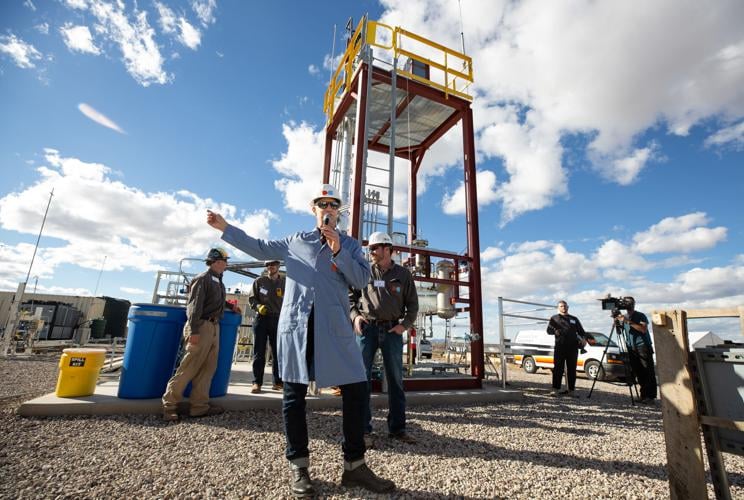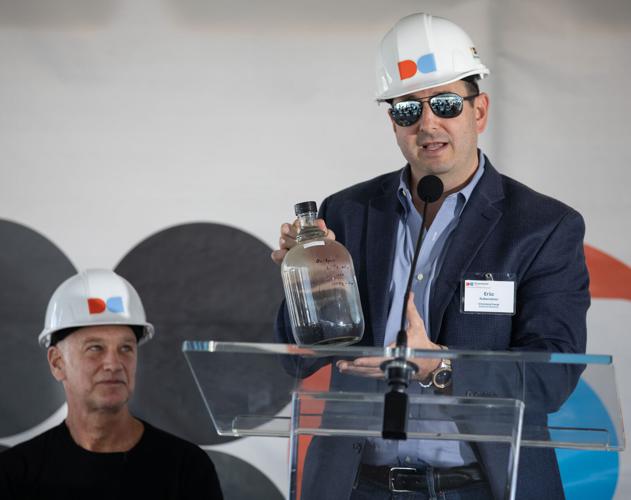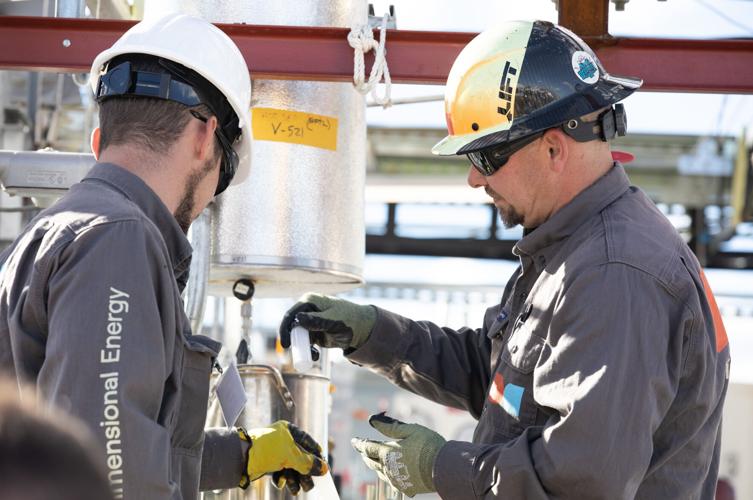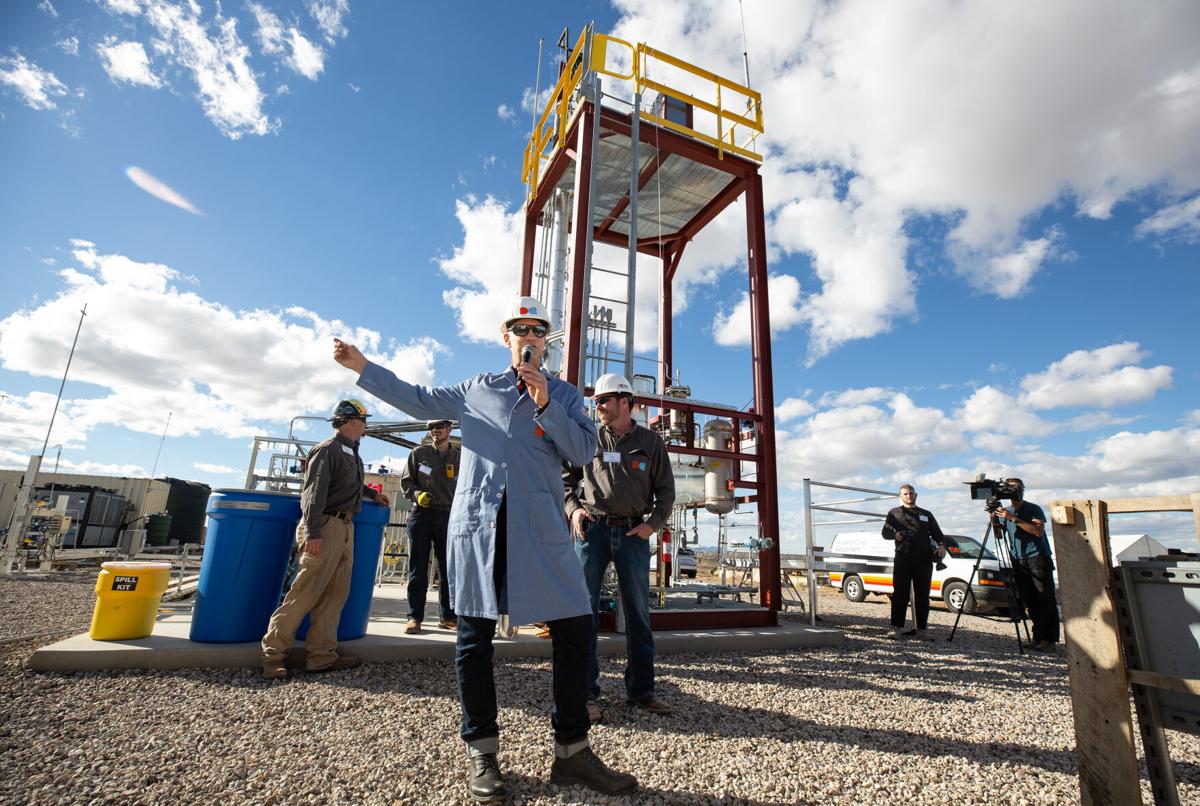A New York-based startup is transforming carbon dioxide, water and sunlight to make sustainable hydrocarbon fuels at a new Tucson facility.
Dimensional Energy celebrated the grand opening of its first-of-a-kind facility at the University of Arizona Science and Technology Park on Wednesday.
The Ithaca, New York-based company’s technology combines carbon dioxide and water through a patented, renewable-energy-powered process to create sustainable aviation fuel and replace other fossil-fuel products ranging from plastics to cosmetics.
And it already has a major customer, United Airlines, in line for its first production run of “sustainable aircraft fuel.”
Dimensional Energy co-founder and CEO Jason Salfi said the company’s technology platform can leverage the trillions of dollars of existing infrastructure that our society relies upon for food, clothing, shelter and transportation “for a transition to a circular economy.”
“Dimensional has the partnerships and patented and proprietary technology to make a meaningful reduction in global greenhouse gas emissions today,” Salfi said.
Scaling up
Salfi was joined at the ribbon-cutting event by the president of United’s venture-capital arm, United Airlines Ventures, an early investor in the company that has signed a fuel purchase agreement for 300 million gallons of sustainable aviation fuel.
The company has about a dozen local workers, about half its workforce, who have been running a pilot carbon utilization plant at the UA Tech Park on South Rita Road continuously since last August.

Dimensional Energy CEO Jason Salfi, left, looks at Eric Rubenstein of United Airlines Ventures holding a bottle with liquid hydrocarbons, which can be refined into aviation fuel, during the opening ceremony of the Dimensional Energy CO2 recycling facility.
The small-scale Tucson project, funded with grants from the U.S. Department of Energy’s Advanced Research Projects Agency-Energy (ARPA-E) and Solar Energy Technology Office, has the capacity to produce 5 gallons of sustainable aircraft fuel per day.
While that’s a small amount of fuel, the company plans to scale up several demo plants and reach production levels of more than 42,000 gallons per day by 2027.
Next year, a pilot project to capture and used carbon dioxide from a cement plant in Vancouver, British Columbia, is expected to generate 84 gallons of jet fuel daily, and in 2025 the company plans a hydroelectric-powered plant in Niagara Falls, New York, expected to make 8,400 gallons per day.
Dimensional’s systems are relatively simple to scale up, Salfi said.
“We use commercially available components and integrate them with our patented reactor and this lowers scale-up risk.”
“The reactor technology is modular and can be numbered up from the scale it currently operates at,” he said, noting that the equipment can be built in fabrication shops all over the world and installed rapidly in the field.
“This is similar to how solar panels got cheaper, through mass production which accelerates the learning curve and drives down cost.”
Making jet fuel
Dimensional Energy’s carbon-dioxide utilization system is based on technology developed by a Cornell University professor that uses a reactor to turn CO2 and hydrogen from water into a synthetic gas, or syngas, in a process that mimics photosynthesis.
The syngas is then fed into a device that uses a 100-year-old technology, known as the Fischer-Tropsch process, that turns carbon monoxide and hydrogen into hydrocarbons that can be refined into fuels and other products. The Fischer–Tropsch process has long been used as part of processes such as coal liquefication, which turns coal into liquid fuel.
“All of these carbon emissions could be avoided if we used the emissions from the past directly from the air to make the syngas that is used to make the liquid fuels for the future,” Salfi said.

Workers from Dimensional Energy collect samples of liquid hydrocarbons from the Fischer Tropsch reactor at the CO2 recycling facility.
Part of an emerging industry to capture and use carbon to combat climate change, Dimensional Energy’s technology got a boost in 2020 as a finalist in the Carbon Xprize, a competition to find the best carbon capture and utilization technologies.
Dimensional Energy also recently completed a yearlong stint with Elemental Excelerator, a growth-stage business accelerator focused on boosting climate-tech companies with offices in and East Palo Alto, California, and Honolulu.
That led to an introduction to United Airlines Ventures, which is looking to buy fuels from Dimensional Energy to help it meet its sustainability goals.
Industry partnerships
United Airlines Ventures President Mike Leskinen said the airline has made early investments in cutting-edge technologies at all levels of the supply chain, staking out a position as a leader in aviation sustainability and innovation.
“As the only airline committed to reaching net zero carbon emissions by 2050 without relying on carbon offsets, we recognized that our collaboration with Dimensional would not only help meet our sustainable aviation fuel goals, but could transform the aviation industry,” Leskinen said in remarks prepared for Dimensional Energy’s grand-opening event.
Salfi said partnerships in sectors of the economy that are difficult to decarbonize such as aviation, trucking, shipping, cement and paper are unlocking Dimensional’s potential to address 10% of global emissions by using emissions from one industry to reduce emissions from another.
Boosted by the recent passage of the Inflation Reduction Act, which includes billions of dollars to support carbon-capture technologies, many businesses have goals of capturing their abundant carbon-dioxide emissions, he noted.
Where carbon capture and storage are impractical, Salfi says Dimensional’s technology can transform carbon at the site of capture and turn it into products like sustainable aviation fuel “that can drop into existing infrastructure and reduce and eventually eliminate the demand for newly extracted fossil fuels.”
Dimensional has been hiring former workers from the oil, gas and mining industries, as well as graduates of Arizona’s universities and others with the skills needed to produce renewable hydrocarbon fuels, in Arizona and worldwide.
Learn how Dimensional Energy, which opened a tech center in Tucson, turns carbon dioxide and water into jet fuel. Video courtesy National Science Foundation.







